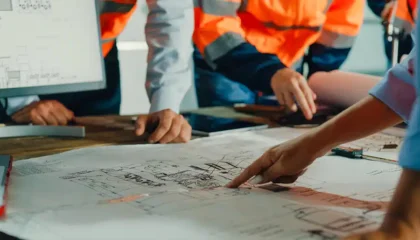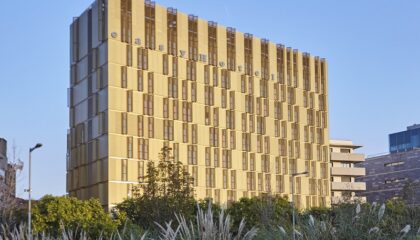At Workman, we’ve always believed that even though we’re in property, we’re all about people. But recognising this truth and acting on it are two different things. Over the past few years, we’ve been on a journey to transform our approach to equality, diversity, and inclusion – not through performative gestures or tick-box exercises, but by building the foundations for lasting change.
Our ED&I strategy didn’t emerge in isolation. It’s part of a broader transformation at Workman that began with listening – really listening – to our people. Through extensive staff interviews and feedback sessions led by an external specialist, we heard clearly that our team wanted to see genuine commitment to creating an inclusive workplace where everyone could thrive.
“We recognised that we had to move beyond decent intentions and latent goodwill,” says Matthew Pateman, Managing Partner. “Our people were telling us they wanted to see real action, real change. That meant not just having policies on paper, but embedding equality, diversity, and inclusion into how we actually work every day.”
The result is our newly refreshed comprehensive ED&I Strategy, built on four core pillars: Leadership & Accountability, Culture Values & Belonging, Recruitment & Retention, and Learning & Awareness. But strategies are only as good as their implementation, and that’s where we’ve focused our energy.
Real change at every level
We’ve established a clear governance framework that ensures ED&I isn’t just another corporate initiative, but a fundamental part of how we operate. With equity partner-level backing from Managing Partner Matthew Pateman and Head of ESG Vicky Cotton, we have leadership accountability at the highest level.
“Senior sponsorship is about leaders being genuinely accountable for real outcomes,” explains Vicky Cotton, Head of ESG. “Matthew and I report directly to the Management Board on progress, and that accountability drives real change across the business.”
Jo Hartle, Senior Associate and Chair of our Employee Networks, implements strategy while Charlotte Bradley, our Head of HR, ensures that ED&I is integrated into all aspects of the employee experience. But perhaps most importantly, we’ve recognised that real change happens at every level – from our Employee Networks to line managers who provide psychological safety to their teams, and enable people to reach their full potential.
“My role is to translate strategy into action,” says Jo. “But the real work happens when our Employee Networks identify issues, when line managers create inclusive teams, when individuals speak up and support each other. Culture change is a collective effort.”
Employee Networks: “the heartbeat of our inclusion work”
Our Employee Networks have been a cornerstone of our approach, and they’ve recently been reset and rejuvenated as part of our refreshed strategy. These four groups, which have been established for several years, now operate with renewed focus and energy:
- The Women’s Network focuses on supporting career progression, addressing workplace challenges, and creating mentorship opportunities for women across the business.
- The LGBTQ+ Network works to ensure the firm is a safe and inclusive place for LGBTQ+ colleagues, while raising awareness and understanding across the organisation.
- The Race, Ethnicity and Cultural Heritage (REACH) Network champions inclusion for colleagues from diverse racial, ethnic, and cultural backgrounds, promoting understanding and belonging.
- The Disability, Neurodiversity and Mental Health (DNMH) Network addresses mental health, work-life balance, and holistic wellbeing support for all colleagues.
“Our Employee Networks are the heartbeat of our inclusion work,” explains Charlotte. “They’ve evolved from informal support groups into powerful voices for change, identifying issues, driving solutions and hold us accountable for progress.”
With help and input from the networks, policies covering everything from parenting and menopause to mental health and neurodiversity have been overhauled, to become practical tools that make a real difference to how people experience work.
“We’ve also embedded inclusion into how we communicate and collaborate,” says Charlotte. “This means using inclusive language in our communications, ensuring diverse perspectives are heard in meetings, and creating space for different working styles and needs.”
Build understanding across the business
Learning is a central pillar in our approach, underpinned by the appointment of our new Learning & Development Manager, Debbie Hayler. We provide specific ED&I training alongside leadership development, interview skills training, and anti-bias training for anyone involved in recruitment. We also organise workshops and speaker events that help build understanding across the business, as well as our recently launched mentorship programme in conjunction with The Circle Partnership, which aims to provide management and leadership learning to upcoming Associates.
“Skills development isn’t just about compliance – it’s about capability,” says Vicky. “We want our people to feel confident having conversations about inclusion, to recognise bias when they see it, and to act as allies for their colleagues. That takes ongoing development, not just a one-off session.”
Building an inclusive culture is about encouraging allyship, supporting our Employee Networks, and creating clear channels for people to raise concerns or share ideas.
Measuring what matters
We’re committed to transparency and accountability. We collect and analyse demographic, engagement, and pay equity data regularly, publishing our gender pay gap report annually. To ensure we’re measuring progress effectively, we have started working with Inclusive Employers, a specialist organisation that helps us track our impact and benchmark our progress against best practice.
“Data tells us where we are, but it’s the stories behind the data that show us where we need to go,” reflects Jo. “We are just at the beginning of our partnership with Inclusive Employers – this will provide the expertise and external perspective we need to make sure we’re not just tracking activity, but actually measuring impact.”
We also prioritise qualitative feedback, particularly from people whose identities intersect across different characteristics. Our Management Board receives quarterly updates on ED&I metrics and actions, ensuring this work remains a strategic priority. We’ve committed to publishing an annual ED&I report that combines narrative, metrics, and clear actions for the year ahead.
The inclusion journey continues
We’re honest about where we are in this journey. Creating a truly inclusive workplace doesn’t happen overnight, and this will be a continual work in progress. But we’re making great strides: employee networks that are driving change, policies that better support our diverse workforce, and a growing culture of belonging.
“The key is being honest about the work still to be done, while celebrating the progress we’re making,” says Matthew. “We’re not perfect, but we are committed. And that commitment shows up in how we invest in our people, how we make decisions, and how we hold ourselves accountable.”
What sets our approach apart is that we haven’t relied on quotas or targets. Instead, we believe equality, diversity, and inclusion should be embedded in everything we do. It’s the responsibility of every employee to foster a culture where equal opportunity is genuine.
As we continue to evolve, we remain committed to the principles that guide us: challenging unconscious bias, promoting inclusive behaviours, and supporting the development and progression of diverse talent through continuous learning and awareness. Our values: autonomy, empowerment, collaboration, integrity and professionalism are the foundation for continuous progress.
“Every policy we update, every conversation we have, every barrier we remove – it all adds up to creating a workplace where everyone can thrive. And in a business built on relationships, that’s not just the right thing to do – it’s essential for our success.”
This isn’t about being cookie-cutter perfect – it’s about being committed to ongoing improvement, creating an environment where everyone can be themselves at work and reach their full potential.
And in a business where great Workmanship means getting the fundamentals right, building an inclusive culture is one of the most fundamental things we can do.
Find out more: Diversity & Inclusion



